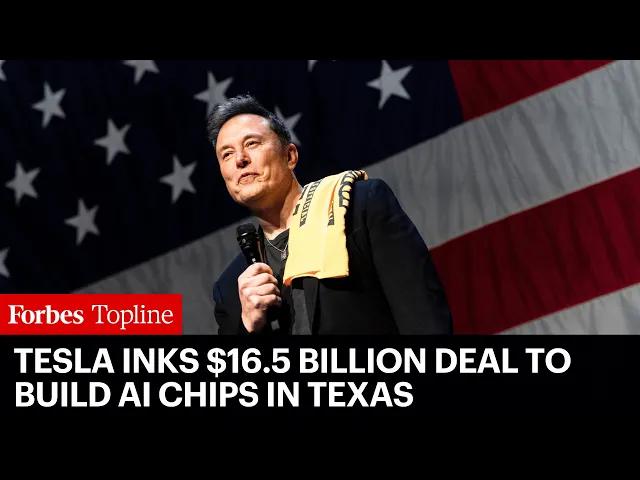Elon Musk Announces Samsung Will Produce New AI Chips For Tesla

Samsung partnership redefines Tesla's AI future
In a strategic move that could reshape Tesla's approach to artificial intelligence, Elon Musk recently announced a partnership with Samsung to produce specialized AI chips for Tesla's vehicles and computing infrastructure. This collaboration marks a significant shift in Tesla's semiconductor strategy and signals the company's intensifying focus on developing proprietary AI technologies that can drive its ambitious autonomous driving goals.
Key developments from this partnership:
- Tesla is deepening its AI hardware strategy by bringing Samsung on as a chip manufacturing partner, potentially reducing reliance on existing suppliers
- The new chips are expected to accelerate Tesla's autonomous driving capabilities through enhanced computational power
- This partnership represents a strategic alignment between two tech giants with complementary expertise in mobility and semiconductor manufacturing
The semiconductor chess game
The most compelling aspect of this partnership is not just the technological advancement it promises, but the strategic positioning it represents in the global AI race. Tesla has been developing its own chips since 2019 when it moved away from Nvidia's solutions, but bringing Samsung into the fold signals a new phase in the company's vertical integration strategy.
This move comes at a critical juncture in the semiconductor industry, where access to advanced chip manufacturing has become a strategic advantage. Companies like Apple, Google, and now Tesla are increasingly designing their own silicon to gain competitive edges in performance, power efficiency, and specialized capabilities tailored to their specific applications. By partnering with Samsung, Tesla gains access to one of the world's most advanced semiconductor manufacturing operations without having to build this expertise entirely in-house.
The timing is particularly significant as the automotive industry undergoes its most profound transformation in a century. Every major automaker is now racing to develop advanced driver assistance systems and fully autonomous capabilities. The computational demands of these systems are extraordinary, requiring specialized hardware that can process vast amounts of sensor data in real-time while consuming minimal power. By controlling more of its chip design and manufacturing relationships, Tesla can potentially accelerate its development cycles and create hardware perfectly aligned with its software needs.
Beyond the announcement: implications for the industry
What wasn't explicitly addressed in Musk's announcement, but deserves attention, is how this partnership might affect Tesla's existing relationship with Taiwan Semiconductor Manufacturing Company (TSMC), which has produced chips for Tesla in the past. The global semiconductor supply chain has become increasingly fragile and politically complex, with geographic diversification
Recent Videos
How To Earn MONEY With Images (No Bullsh*t)
Smart earnings from your image collection In today's digital economy, passive income streams have become increasingly accessible to creators with various skill sets. A recent YouTube video cuts through the hype to explore legitimate ways photographers, designers, and even casual smartphone users can monetize their image collections. The strategies outlined don't rely on unrealistic promises or complicated schemes—instead, they focus on established marketplaces with proven revenue potential for image creators. Key Points Stock photography platforms like Shutterstock, Adobe Stock, and Getty Images remain viable income sources when you understand their specific requirements and optimize your submissions accordingly. Specialized marketplaces focusing...
Oct 3, 2025New SHAPE SHIFTING AI Robot Is Freaking People Out
Liquid robots will change everything In the quiet labs of Carnegie Mellon University, scientists have created something that feels plucked from science fiction—a magnetic slime robot that can transform between liquid and solid states, slipping through tight spaces before reassembling on the other side. This technology, showcased in a recent YouTube video, represents a significant leap beyond traditional robotics into a realm where machines mimic not just animal movements, but their fundamental physical properties. While the internet might be buzzing with dystopian concerns about "shape-shifting terminators," the reality offers far more promising applications that could revolutionize medicine, rescue operations, and...
Oct 3, 2025How To Do Homeless AI Tiktok Trend (Tiktok Homeless AI Tutorial)
AI homeless trend raises ethical concerns In an era where social media trends evolve faster than we can comprehend them, TikTok's "homeless AI" trend has sparked both creative engagement and serious ethical questions. The trend, which involves using AI to transform ordinary photos into images depicting homelessness, has rapidly gained traction across the platform, with creators eagerly jumping on board to showcase their digital transformations. While the technical process is relatively straightforward, the implications of digitally "becoming homeless" for entertainment deserve careful consideration. The video tutorial provides a step-by-step guide on creating these AI-generated images, explaining how users can transform...
